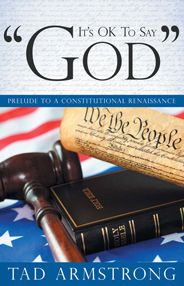6 Jan 2010
History Shows Proposed Reform as Unconstitutional
© St. Louis Post-Dispatch
Tad Armstrong
U.S. Supreme Court ultimately will reject pending health care reform bill.
As our country moves toward passing a health care bill that many legal scholars believe to be unconstitutional, it is more important than ever that the average American becomes more familiar with our founding document. I am on a mission to help transport our populace from its current state of constitutional lethargy to a place that will enable “We, the People” to govern ourselves again.
Since I began my intense study of our founding document, I have discovered that ignorance resides on Wall Street, on Main Street, in the halls of our universities, on the assembly lines of the few factories that still exist and at its favorite abode, our nation’s Capitol.
If most of our populace makes decisions based upon sound bites and headlines, it is a safe bet that the results of polls (taken among voters and non-voters alike that some U.S. Supreme Court justices are willing to admit influence them), in large part, are a culmination of opinions of the ignorant.
If that sounds arrogant, please understand that ignorance once lived at my house. And, if you do not believe we have lost touch with the framers’ design, you are either greatly mistaken or a demagogue who strives to keep America in the dark.
Self-governed people who are so complacent that they have forgotten who holds the keys to the bus are destined to be driven wherever their designated driver wishes to take them, not as their servant, but as their master. Our worst enemy is ignorance!
I am a conservative who is keenly aware that constitutional knowledge is lacking in all political camps. James Madison said, “Knowledge will forever govern ignorance; and a people who mean to be their own governors must arm themselves with the power which knowledge gives.” The good news is that Americans are eager for a constitutional renaissance.
The hottest topic of the day is the health care bill. Much has been written about its unconstitutionality, inclusive of Sen. Dianne Feinstein’s erroneous view that it finds support in the commerce clause of Article I. If the powers of Congress granted by the constitution were unlimited, listed powers specifically granted in Section Eight would be unnecessary.
You will not find health care on that list, but one of the listed powers most often relied upon by those in federal government who hunger for more power than “We, the People” have given them has been the commerce clause, the relevant portion being: “Congress shall have power to regulate commerce…among the several states…” Not “within,” but “among” the several states.
Although the commerce power has been exceeded for decades, we have two recent Supreme Court decisions that provide hope that this devastating bill, if it comes to life, would be short lived.
In U.S. v. Lopez (1995), the court was asked to determine whether Congress had the power to criminalize possession of a firearm in a school zone. The federal government used what I call the “Kevin Bacon Game Approach” to logic. It argued that because guns pose a threat to learning and a handicapped educational environment leads to a less productive citizenry, such a negative impact on the nation’s economic well-being makes gun possession near a school a type of commerce “among” the several states, which Congress has the power to regulate.
The court struck down the act, not because possession of guns near schools is a good idea, but because the commerce clause cannot be stretched so far as to give Congress, as opposed to the states, the power to criminalize it.
Justice John Paul Stevens, in dissent, is so far out of touch with the Constitution that he would effectively give Congress unlimited power to do anything via the commerce clause as long as it relates to anything that has been or will be purchased. He lost.
Likewise, in U.S. v. Morrison (2000), the court struck down an attempt by Congress to provide a federal civil remedy for victims of gender-motivated violence. It was not an enumerated power and could not be stretched to fit “commerce among the several states.”
Health care, in essence, is a service “within” not “among” the several states. Congress has exceeded its powers in numerous areas. The Supreme Court should not permit health care to be added to those excesses.

Comments










